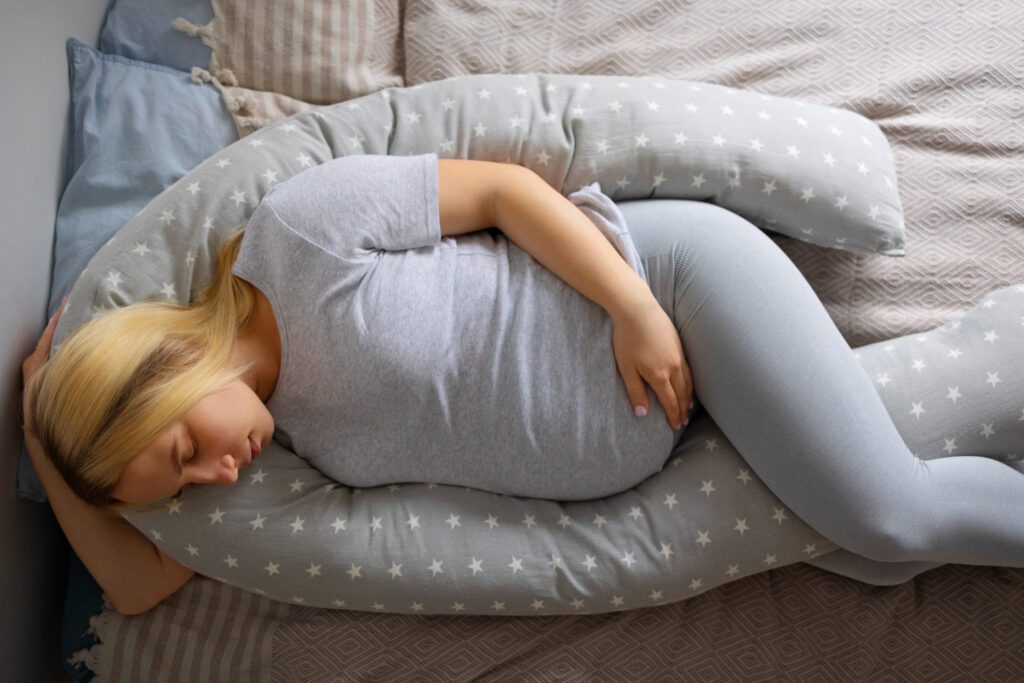How to Sleep Better During Pregnancy: 9 Helpful Tips
Getting good sleep during pregnancy isn’t always easy. Between physical changes, frequent trips to the bathroom, and general discomfort, many expectant mothers struggle with rest. That’s why learning how to sleep better during pregnancy can make a big difference for both your health and your baby’s well-being. But sleep is especially important during this time — for both your health and your baby’s. The good news is that with a few adjustments, you can improve your sleep and wake up feeling more refreshed (learn more on Sleep Foundation).
1. Find a Comfortable Sleeping Position
As your pregnancy progresses, sleeping on your back may feel uncomfortable. If you’re wondering how to sleep better during pregnancy, experts often recommend sleeping on your left side to improve blood flow to your baby and reduce pressure on internal organs. Adding a pregnancy pillow or extra cushions can help support your belly and back.

2. Stick to a Relaxing Bedtime Routine
Calming activities before bed signal to your body that it’s time to wind down. Try reading, gentle stretches, or listening to soft music. Avoid screen time right before bed, as blue light can interfere with melatonin, the sleep hormone.
3. Stay Hydrated (But Plan It Wisely)
Drinking plenty of water during the day is important, but try to limit fluids right before bed to reduce nighttime bathroom trips. Keep a glass of water nearby, though, in case you wake up thirsty.
4. Manage Heartburn and Indigestion
Heartburn is a common issue during pregnancy that can make sleep difficult. Eating smaller meals, avoiding spicy foods before bedtime, and elevating your head slightly with an extra pillow can help reduce discomfort.
5. Keep Your Room Cool and Comfortable
Your body temperature naturally runs a little higher during pregnancy, which can make you feel warmer than usual. Use breathable bedding, wear light pajamas, and keep a fan or window open for airflow.
6. Take Naps When Needed
It’s normal to feel more tired while pregnant. Short naps (20–30 minutes) during the day can give you a boost without interfering with nighttime sleep. Just avoid long or late naps, which can disrupt your sleep cycle.
7. Practice Gentle Pregnancy-Safe Exercise
Light activity such as walking or prenatal yoga can help reduce restlessness and improve sleep quality. Just try to finish workouts earlier in the day, not right before bed, to avoid feeling too energized.
8. Calm Your Mind with Relaxation Techniques
Pregnancy can bring new worries, and stress can make it harder to sleep. Breathing exercises, guided meditation, or simply writing down your thoughts before bed can help calm your mind.
9. Talk to Your Doctor if Sleep Problems Persist
It’s normal to have some restless nights, but if you’re experiencing severe insomnia, sleep apnea, or discomfort that affects your daily life, it’s important to check in with your healthcare provider. Your doctor can guide you safely, considering your pregnancy needs.
Quick Recap of 9 Helpful Tips
- Sleep on your side with pillows for support
- Create a relaxing bedtime routine
- Stay hydrated but limit fluids at night
- Manage heartburn with diet and pillows
- Keep your room cool and comfy
- Take short naps if needed
- Try gentle exercise during the day
- Use relaxation techniques to reduce stress
- Consult your doctor for ongoing sleep issues
The bottom line: Learning how to sleep better during pregnancy takes some adjustments, but simple changes like side-sleeping, cooling your room, and managing heartburn can make nights more comfortable. Prioritizing rest now will help both you and your baby.
FAQs: How to Sleep Better During Pregnancy
1. Why is it harder to sleep during pregnancy?
Physical changes, frequent bathroom trips, heartburn, and general discomfort are common reasons pregnant women struggle with sleep.
2. What is the best sleeping position in pregnancy?
Sleeping on your left side is often recommended, as it improves circulation and reduces pressure on important organs.
3. Are pregnancy pillows worth it?
Yes, many women find that body or wedge pillows provide extra support and help reduce back and hip discomfort.
4. Can I nap during the day if I don’t sleep well at night?
Short naps (20–30 minutes) can be helpful, but avoid long or late naps that may disrupt your nighttime sleep.
5. Should I be worried if I can’t sleep well during pregnancy?
Occasional poor sleep is normal, but if insomnia or discomfort continues, it’s best to discuss it with your doctor.

Some truly interesting info , well written and generally user friendly.
Its excellent as your other articles : D, appreciate it for posting.
I dugg some of you post as I cerebrated they were extremely helpful very useful
You have mentioned very interesting details! ps nice site.
What¦s Going down i am new to this, I stumbled upon this I’ve discovered It positively helpful and it has aided me out loads. I’m hoping to give a contribution & assist other users like its aided me. Great job.
F*ckin’ tremendous things here. I am very satisfied to look your article. Thanks so much and i’m having a look forward to touch you. Will you kindly drop me a e-mail?
I have been examinating out a few of your articles and i can state pretty nice stuff. I will make sure to bookmark your site.